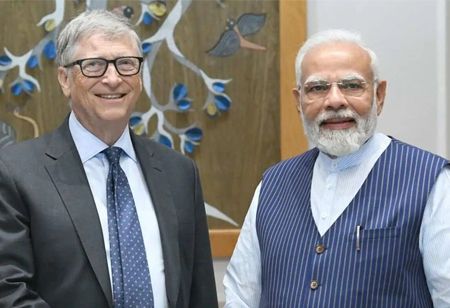
Tech Over tics: PM Modi and Gates Discuss the Future of Tech in India


Chai must be the GOAT of drinks. During his latest visit to India, Bill Gates, one of the pioneers of digital transformation, interestingly hit viral nerves on social media by posing with the star Chaiwala on Instagram 'Reels.' At the business end of things, Gates met with Indian PM Narendra Modi, who is often admired for his humble background as a tea vendor in his childhood. Under the prominent leadership of Prime Minister Narendra Modi, the digital India wave is sweeping across the country, transforming lives. Besides, the financial technology ecosystem is powering financial inclusion in the country. The latest developments in the country have caught the attention of world leaders. Let us know more about the key takeaways of two great leaders’ discussions about India’s tech revolution.
India’s Digital Revolution and Empowering Women with Technology
Speaking about the digital push, PM Modi says, “It was possible only because of democratizing the technology, and people could value it according to their needs. I decided I would not allow a digital divide in India and hence took the infrastructure to villages across the country.”
He adds, “Digital public infrastructure is a major requirement in itself. Women are more open to adopting new technology in India. I have started the ‘Namo Drone Didi’ scheme. They say they didn’t know how to ride a bicycle but are now pilots and can fly drones. The mindset has changed,” says PM.
The program aims to make women the change makers in villages by employing drones for crop monitoring, fertilizer application, and seed swapping. The confidence in the common man about technology was also increased by the schemes.
The Prime Minister cited the example of two lakh Ayushman Arogya Mandirs across the country using digital health services to provide a host of services.
AI in Education
During the discussion about technology democratization, the conversation shifted to democratizing AI into education, shedding light on India's ambitious plans to use artificial intelligence to improve learning outcomes and close the educational gaps in the country. PM Modi shared his vision of using artificial intelligence to revolutionize education and ensure that every child, regardless of background, has access to high-quality instruction.
Bill Gates supports PM’s visions by emphasizing the transformative potential of AI in shaping the future of education. He says, “AI has the power to personalize learning experiences, address the learning needs of the individuals, and unlock the full potential of each student. There is a need for innovative approaches to integrate AI into curricula and enhance teaching methodologies.”
The discussion delved into methods for incorporating artificial intelligence into the educational system, with a particular focus on enhancing the capacity of teachers and student involvement. Modi promoted the benefits of artificial intelligence for learning and skill development.
India's commitment to using technology for inclusive education sets a powerful example for the rest of the world, according to Gate. He also highlighted the importance of fostering partnerships between government, tech companies, and educational institutions to drive innovation and scale up AI-enabled solutions.
Addressing AI Challenges
Modi points out the importance of addressing the challenges posed by artificial intelligence and says, “The chances of misusing deep fake technology are higher in a democratic country like India. They might, for instance, abuse my voice in inappropriate ways. The initial deception can lead to widespread chaos. Recognizing that deep fake content is created by artificial intelligence is crucial, as well as naming its source. These steps are crucial, especially at the beginning. We need to establish guidelines for behavior. Furthermore, it is essential to begin working with AI within a particular area of expertise.”
Gates says, “It's early days in AI. You're often surprised at how good it is, and you're also surprised at how bad it is. It'll do things you think are hard, and then it'll fail to do some things you think are easy."
Green Hydrogen Project
During the discussion with Bill Gates, Modi emphasized the urgent need to redefine global economic progress indicators to combat climate change. During the interaction, Modi proposed the concept of green gross domestic product (GDP), highlighting its potential to integrate environmental considerations into economic growth assessments.
The PM also expressed concern about the conventional parameters of progress, such as steel consumption and energy use, underscoring their detrimental effect on climate change. He advocated a radical approach to progress metrics that favor eco-friendly innovations and eco-friendly lifestyles, calling for a global shift in terminology towards eco-friendly gross domestic product. A more holistic view of growth is suggested by this innovative metric, which aims to capture the environmental costs associated with economic endeavors.
Modi shares his concerns about climate responsibilities among nations after the G20 Summit in India. He also shared India's strides in renewable energy, particularly in the solar, wind, and green hydrogen sectors, along with efforts to foster innovation in emerging technologies through substantial funding and support mechanisms.
Reflecting on the interaction, Bill Gates praised Modi's 'Mission Innovation' initiative for promoting global collaboration in clean energy development, a crucial step towards achieving the objectives of the Paris Agreement. Gates, however, was equally concerned about the difficulties in limiting global warming to agreed-upon targets, citing the record-breaking temperatures and the escalating production of greenhouse gases as pressing issues.
The two leaders emphasized the significance of consumer choices in promoting green products and minimizing environmental impacts. This discussion highlights a shared vision between Modi and Gates towards fostering environmental sustainability through innovative measures and lifestyle changes. It marks a significant dialogue on global climate action.